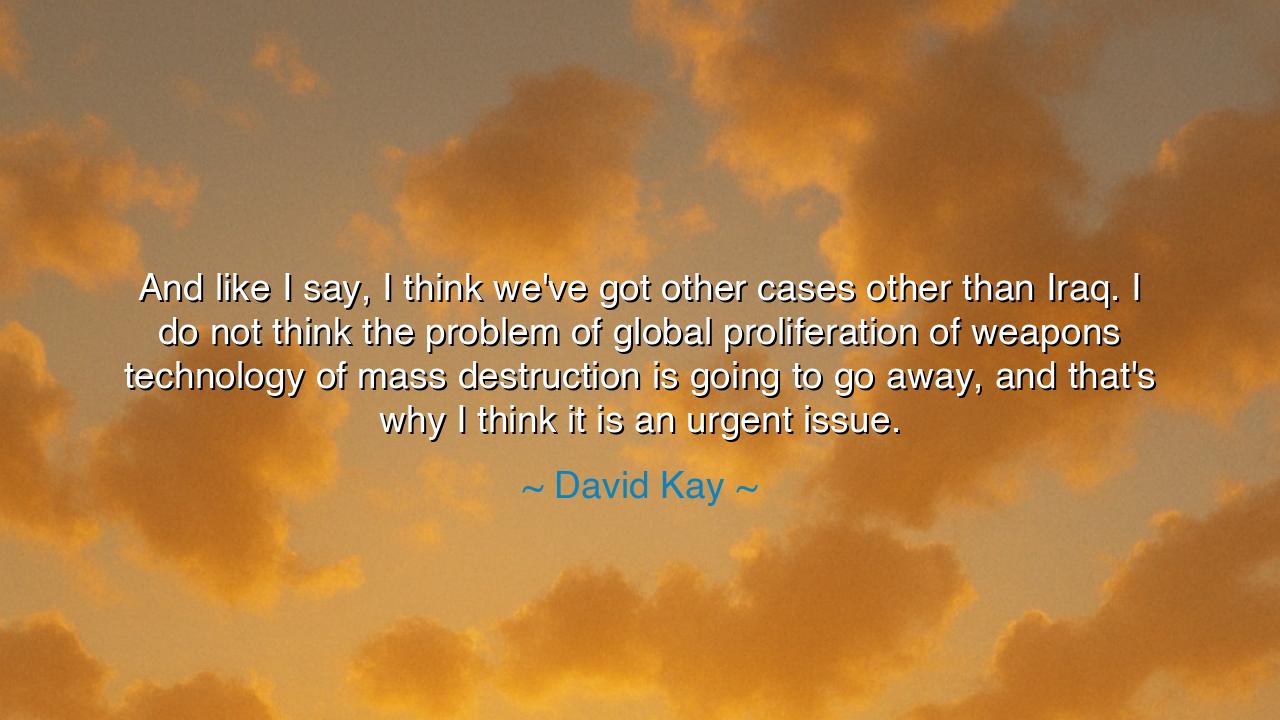
And like I say, I think we've got other cases other than Iraq. I
And like I say, I think we've got other cases other than Iraq. I do not think the problem of global proliferation of weapons technology of mass destruction is going to go away, and that's why I think it is an urgent issue.






The words of David Kay, “And like I say, I think we've got other cases other than Iraq. I do not think the problem of global proliferation of weapons technology of mass destruction is going to go away, and that's why I think it is an urgent issue,” resound with the solemnity of a warning from the heights of human experience. He speaks not merely of one nation, but of a persistent and pervasive danger: the spread of weapons of mass destruction across the globe. His insight reminds us that technological capability, when aligned with ambition or malice, can threaten the very fabric of civilization. It is a call for vigilance, foresight, and moral courage.
The origin of this reflection lies in Kay’s career as a weapons inspector and expert in arms control. Tasked with assessing Iraq’s programs after the Gulf War, he witnessed firsthand the complexity and danger of proliferation. But his vision extended beyond Iraq; he recognized that the diffusion of chemical, biological, and nuclear technology is not confined to one regime. The challenge is ongoing, global, and urgent, demanding international attention, collaboration, and preventive measures to safeguard humanity.
History offers stark lessons in the consequences of proliferation unchecked. During the Cold War, the rapid expansion of nuclear arsenals between the United States and the Soviet Union created a precarious balance, in which human survival depended upon restraint, diplomacy, and careful management. Each new weapon was not merely a tool of defense; it was a symbol of power that could easily spiral into catastrophe. Kay’s words echo this lesson: proliferation carries both potential and peril, and vigilance is necessary to prevent disaster.
Even within smaller conflicts, the use of chemical weapons during the Iran-Iraq War of the 1980s illustrates the dangers Kay highlights. These weapons were not contained to laboratories; they became instruments of terror on battlefields, causing unimaginable suffering and demonstrating how technology, when misused, can amplify cruelty. His assertion underscores the urgency: the problem does not vanish with a single intervention; it is a persistent challenge that demands continuous attention.
The meaning of Kay’s words is profound: the global community must recognize that weapons technology is not neutral. It magnifies human ambition and human flaws alike. Just as fire can warm or destroy, mass-destruction technology can protect or annihilate. The persistence of this threat makes engagement and vigilance moral imperatives. Ignoring proliferation is not an option; the stakes are the survival, freedom, and dignity of entire populations.
The lesson for humanity is clear and timeless: preparedness, ethics, and international collaboration are essential to navigate the challenges of advanced technology. Preventing the spread of weapons is not merely a political exercise—it is a responsibility of civilization itself. Kay teaches that urgency must be matched by action, foresight, and wisdom, for procrastination can yield consequences that are irreversible.
Practical action follows naturally. Support treaties and international agreements that limit the spread of nuclear, chemical, and biological weapons. Educate yourself about global security challenges and advocate for diplomacy, intelligence sharing, and verification mechanisms. Encourage policies that address root causes of proliferation, such as political instability and lack of transparency, while fostering international cooperation to manage emerging threats responsibly.
Thus, let David Kay’s words echo through the generations: the proliferation of weapons of mass destruction is an urgent global issue that will not disappear on its own. May we approach this challenge with vigilance, wisdom, and courage, ensuring that human ingenuity is directed toward protection and progress rather than destruction. In understanding and confronting this threat, we honor the sacred duty to safeguard life, liberty, and the future of humanity itself.






AAdministratorAdministrator
Welcome, honored guests. Please leave a comment, we will respond soon